How would your world look without the Internet?
Do you remember when people relied on landline phones, letters, and face-to-face communication to stay in touch? Or when accessing information involved encyclopedias, libraries, and long hours of research? For some, this is a distant memory. For others, it is impossible to imagine altogether.
There is no denying that the Internet has transformed humanity and catalyzed social progress. Those with Internet connections now have instant access to information and communication. It would be tough for us to turn back time.
But did you know this Internet we know and count on could deteriorate if we don’t take action?
Industrial interests that want to own the Internet and governments who want to control it, fragment it, or shut it down are constant threats.
If we allow this to continue, the Internet we use today could look very different tomorrow. This would mean a restricted or fragmented online experience in which we can no longer do the same things as we once did.
Did you know that you can help protect the open Internet?
The Internet is the people’s medium. It has always been a resource by people, for people. No one entity has the keys. And despite how many may try, it was never intended to be run by a single body, government, or corporation. It was meant to be run by everyone.
That’s why we’re asking you to Run The Internet with us.
“Run the Internet” is a 7-day movement challenge to show that we all have a part in running the Internet.
From 5–11 June 2024, pledge to run, walk, bike, or swim a distance of your choice on behalf of the Internet. The funds you raise will go towards Internet Society’s work to achieve an Internet for everyone.
You decide how, when, where, and how far you want to go.
This is your chance to make a difference. Let’s demonstrate our collective responsibility to preserve and care for the Internet.
The Internet is strongest when everyone has a say.
A large portion of our work at the Internet Society involves defending the Internet against decisions that threaten it.
Whether they know it or not, governments are increasingly adopting misguided policies that are slowly but surely making the Internet less open, less secure, and less accessible.
While many of these policy decisions are made by individual nation-states, these discussions are becoming more acute in the UN, where governments discuss policy matters of global interest.
We’re here to educate Internet users and decision-makers that the Internet should not be regulated or shaped in a top-down manner. Internet governance should be determined by inclusive processes driven by consensus. We get better answers to global questions when a variety of interested parties can meaningfully participate in the discussion.
But we cannot do it without you.

